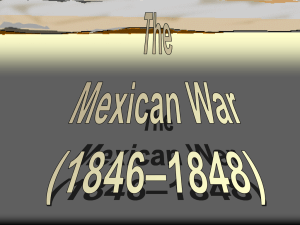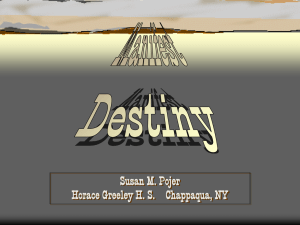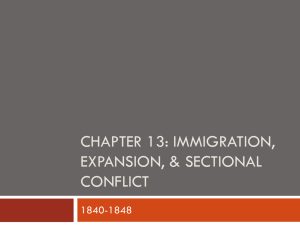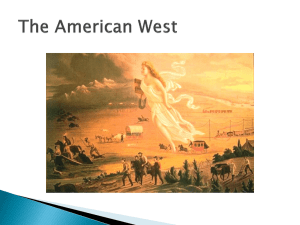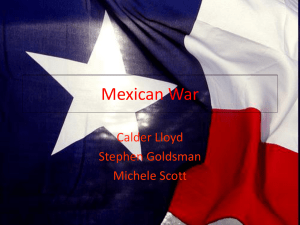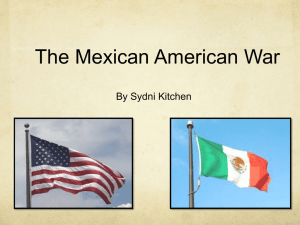We Take Nothing By Conquest, Thank God
advertisement
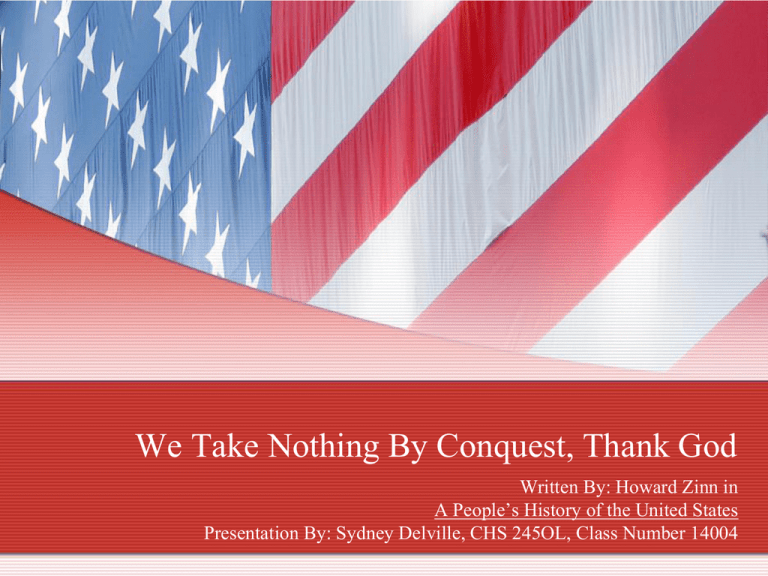
We Take Nothing By Conquest, Thank God Written By: Howard Zinn in A People’s History of the United States Presentation By: Sydney Delville, CHS 245OL, Class Number 14004 Overview • During the course of the presentation these are the important United States events and concepts that will be presented on… • • • President Thomas Jefferson • • • Louisiana Purchase Mexico Independence Texas apart of the United States Union President James Polk Orders • • The Start of the acquisition of California Invasion of Rio Grande Start of the Mexican- American War • • Spring of 1846 President Polk push for the declaration of war against Mexico • Congress get push to declare War Against Mexico • • Support for the Mexican- American War Soldiers of the War • • • • • • Democrat Party wants to declare war, Whig Party does not • Measure passed 40-2, thus, Congress declares war on Mexico • Anti-Slavery Congress members did not want to declare war on Mexico Voluntary draft • • Lack of water and resources Horrible conditions Solider Recruitment: Continuation of Solider of the War • • First there was a lot of recruitment but recruitment stopped German and Irish immigrants Update on the Battlefield Independence of the States • • California and New Mexico invasion Mexican revolts rebel and fight back Mexican American War, The End is Near In the end President Thomas Jefferson • • • Louisiana Purchase (Primary Documents of History, Library of Congress) • Occurred on October 20, 1803, when the United States purchased Louisiana Territory from France for $15 million • Doubled the territory of the United States extending into the Rocky Mountains Mexico gained Independence • In 1821 Mexico won independence from Spain. Mexico at the time included Texas, New Mexico, Utah, Nevada, Arizona, California and a part of Colorado. In 1836 Texas broke off from Mexico and declared itself “Lone Star Republic” ─ In 1845 Texas was brought into the Union as a state of the United States Louisiana Purchase Mexico’s territory in 1821 President James Polk • • President James Polk entered the White House as an expansionist • On the night of his inauguration he confessed to his Secretary of the Navy that one of his major objectives was the acquisition of California. The start of the acquisition of California • President Polk ordered General Zachary Taylor the twelfth president of the United States, to move troops to the Rio Grande in order to challenge the Mexicans • General Taylor did not agree with the idea of annexation of Texas, but since getting his marching orders his attitudes changed • General Taylor moved troops to Corpus General Zachary Taylor Christi, Texas just cross the Nueces River • In February 1846 the troops then moved down the Gulf Coast to the Rio Grande • March 28, 1946 troops invaded abandon territories by the Mexicans • The newspaper the Washington Union published an article expressing the position of President Polk and the Democratic Party President James Polk Start of the Mexican-American War • • • • • • Spring of 1846 the President Polk finally got the military incident that he wanted In April Colonel Cross disappeared while riding up the Rio Grande. Eleven days later he was found dead. It was assumed that he was murdered by the Mexican guerrillas. April 25, 1846 a patrol of General Taylors soldiers were attacked by Mexicans and wiped out. Leaving 16 dead, others wounded and the other captured. General Taylor then sent a message to President Polk about the hostages. According to Colonel Hitchcock the Mexicans fired the first shot but it was only because the United States Government wanted them to. May 9, 1846 before any battles were started President Polk gathered his cabinet suggesting the declaration of the Mexican American war. • President Polk used the dispatch of American troops to the Rio Grande as a necessary of war measure. President Polk and his cabinet Congress Gets Pushed into Declaring War Against Mexico • After President Polk used the American troops to the Rio Grande as a reason for necessary measure of defense. • Polk then sent American troops into dissent territory, historically controlled and inhabited by the Mexicans • Due to this decision by President Polk, Congress rushed to approve the war message. • The Democratic in the house during this time promptly agreed to Polk’s war recommendations. • The Whig Party however, was did not agree on declaring war against Mexico, the party wanted California but did not want to involve the country in war. • Senate had one day to debate on the declaration of war on Mexico • The measure passed 40-2 with the Whig Party joining the Democrats • Anti-Slavery Congress members did not want to declare war on Mexico, because they saw the extension of the United States as a way of extending the southern slave territory • Many different demonstrations in various locations including Baltimore, Philadelphia, New York, and Indianapolis for the war, and many individuals began to volunteer for the army • Support for the War • • As the Mexican-American War started in the Spring of 1846 the opposition grew Many different individuals and organizations such as the… • • • • • • • American Anti-Slavery Society Poet Henry David Thoreau, who stopped paying his poll taxes because of his opposition with the war The American Peace Society Congressman Abraham Lincoln Frederick Douglas former slave and speaker New York and Irish workingmen Frederick Douglas American Anti- Slavery Society Popular opinion was very hard to say ̶ The popular opinion was taken from the newspapers claiming to be the voice of the people. Due to this it is impossible to know the extent of popular support of the war Henry David Thoreau Abraham Lincoln Introduction Documentary Clip http://www.youtube.com/watch?v=Hj UEBDOOSDM (Click link to play video in browser) In this documentary clip produced by the History Channel, discuss what has been explained thus far in the presentation including how the war started, what President Polk’s intentions were for the war. Soldiers of the War • • • At first there seemed to be enthusiasm that was founded by patriotism with the United States and money There is very little knowledge of Mexican soldiers in the war There is more knowledge of American soldiers including • The amount of individuals who volunteered for the war • Lured by money and opportunity for social advancement • Mostly German and Irish immigrants • Irish and German soldiers not loyal to the United States and deserted to the Mexican side forming their own battalion This is an example of what a recruitment poster would look like, specifically for the United States troops Soldier Recruitment: Continuation of Soldiers of the War • Recruitment of soldiers • Promises and lies in order to get people to enlist in the army • Fall 1846 physical requirements for enlistment to the army lowered in order to enlist more people This is a painted depiction of soldiers in the Mexican American War Mexican soldiers are in the green American soldiers are in the blue Update on the Battlefield • During the same time as the United States recruiting more soldiers • In the battlefield, Mexico brought 5 thousand soldiers to Rio Grande to meet the United States, with 3 thousand soldiers and they began to release fire on each other. • This left 500 Mexican soldiers dead or wounded • 50 American causalities This painting is a depiction of what is imagined to happen during the Mexican American war against the Mexican and American troops Independence of States? • In California at this same time • • In New Mexico during August • • General Kennedy moved United States troops into New Mexico and Santa Fe was taken without a battle In New Mexico during December • • • Anglo Americans invaded Spanish colonist and began to still horses and declare that California was no longer Mexicans in Tao rebelled against U.S. soldiers Many Mexicans were arrested and killed. Of those individuals that were not killed or arrested they escaped and attacked and killed a number of Americans In September of 1846 • Many different Mexicans revolted forcing American garrisons to surrender. This is a painting of the Mexican troops Mexican-American War, The End is Near • As General Taylor was moving troops southward towards Rio Grande the conditions for the soldiers worsened. • • • • • Many soldiers became unruly in Mexican territories and plagued Mexican villages with drunk soldiers, and the counts of rape heightened Heat became unbearable, the water was impure, and sickness overall grew One thousand soldiers died under these conditions The death toll continued to grew as the soldiers moved southward to Monterey and fought in other battles As the war continued it was looked at as the Mexican elite against the American elite killing each others soldiers as well as their own. Mexican-American War, The End is Near • The last battle ̶ ̶ General Scott moved towards Mexico City On the outskirts of Mexico City, in Churubusco Mexican and American troops fought and one thousand soldiers died In September 1847, Anglo American troops entered Chapultepec of 200,00 people as General Santa Ana of Mexico's side moved northward ̶ • March 1847 ̶ ̶ • Army troops reported over a thousand deserts Total number of deserts during the war was 9,207 August 15th 1847 ̶ Volunteer regiments form Virginia, Mississippi, and North Carolina rebelled in the North of Mexico against Colonel Robert Treat Pain. • Mexico surrendered • Glory of the war was well celebrated by President Polk and the generals including General Scott and General Taylor This is a painting of General Scott as he invades Mexico City In The End • Mexico surrendered • Treaty of Guadalupe Hidalgo ̶ ̶ One of the biggest documents signed after the Mexican-American War Signed February 1848 • Texas boundary was set at Rio Grande • New Mexico and California were now apart of the United States • The United States paid Mexico $15 million ̶ Which led the Whig Intelligence to conclude that “We Take Nothing By Conquest…. Thank God” The Treaty of Guadalupe Hidalgo document Reference Page "Mexican American War." YouTube. History Channel, 28 Sept. 2009. Web. 03 Apr. 2014. "Primary Documents in American History." Louisiana Purchase: Primary Documents of American History. Library of Congress, n.d. Web. 03 Apr. 2014. Zinn, Howard. A People's History of the United States. New York: Harper Perennial Modern Classics, 2005. Print.
